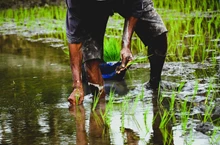
On Monday, the Lok Sabha took barely four minutes to pass a bill to repeal three controversial farm laws that forced farmers protest at Delhi's borders for over a year.
The government's unwillingness to listen to the Opposition's demand for a debate in the House on a subject that has been widely discussed on many platforms across the nation is startling — but not surprising.
This is reminiscent of how the contentious laws were forced through Parliament in September 2020 without sufficient consideration, as demanded by the Opposition, leading to widespread skepticism of the reforms itself in the society, particularly among farmers.
In fact, the government's obstinacy was a fundamental reason why, after 11 rounds of discussions and Supreme Court intervention, it was unable to persuade demonstrators to accept crucial reforms.
Prime Minister Narendra Modi announced the decision to repeal the Acts on Guru Purab. However, since these Acts were enacted by the House, a televised address to the nation is no replacement for a proper explanation and discussion in Parliament.
Union ministers took to social media to celebrate the PM's withdrawal as a great gesture in the national interest — though it was never specified what was against the national interest. So, what were the prerequisites? Was the government's failure merely a case of misunderstanding?
What has been the outcome of state-level "reform" efforts? Should the Centre now allow states to choose their own agricultural reform pathways based on local political economy demands, rather than imposing centralized solutions on a sector with a broad range of cultivation techniques and markets?
Then there's the farmers' ongoing desire that the minimum support price be made a legal entitlement, which creates a slew of complicated difficulties. Even many who opposed the farm laws appear to agree that Indian agriculture is in a state of crisis and requires radical alternatives
So, where do we go from here? All of these issues, as well as the tragedy in Lakhimpur Kheri, where a central minister's son was detained on suspicion of running over a march with his SUV, killing five people, require intense debate in Parliament. Agriculture is a profoundly disputed domain, and policy-making in the sector necessitates dialogues across borders, as the government should know by now. Indeed, the agricultural community, even those in the forefront of protests, has gone through a time of education and serious introspection about farm operations, according to their own admission.
Modi is fond of referring to the Constitution as a holy book and the Parliament as a temple. His government, on the other hand, has been found inadequate in living according to the letter and spirit of that holy book and has regularly exploited its electoral majority to force its will on Parliament by stifling dissident voices and disregarding custom and procedure. Parliamentary debates are vital to its survival; their absence will weaken the institution, cast suspicion on the next set of laws, and exacerbate already-existing fault lines.











